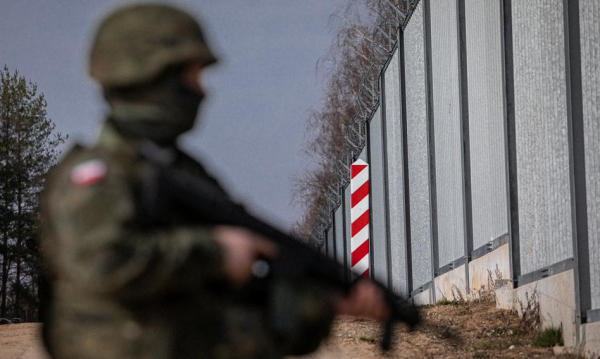Russia and Belarus are bringing migrants to the border and pushing them into the EU, in order to use the fear of them to strengthen far-right parties, and thus, through a political process, to destroy the EU from within – said the head of the Ministry of Foreign Affairs, Radosław Sikorski. We will not tolerate this – he emphasized.

The head of the Ministry of Foreign Affairs, who was visiting Romania on Thursday, was asked by journalists whether the temporary, territorial suspension of the right to submit an application for international protection could actually reduce the pressure on Poland from Belarus.
The Minister noted that “the right to asylum was constructed “for individual cases”, and currently “there are millions of people who often fear persecution, not without reason”, while the situation on the Polish-Belarusian border is “a planned action by the Russian and Belarusian states – bringing potential migrants from the Middle East, training them to transport them to Belarus and pushing them out within the European Union with a very clear, political idea”.
According to Sikorski, Russia and Belarus are trying to “strengthen far-right parties in the European Union with the help of migrants and fear of them, and in this way, through the political process, to break up the EU from within.” “Unfortunately, we have politicians in Poland who want to help Russia in this endeavor. We will not tolerate this,” Sikorski said.
He noted that “after a period of calm”, the number of attempts to cross the Polish-Belarusian border increased to several hundred per day. He also noted that “the information the government receives from the Border Guard shows that 98 percent of these attempts are unsuccessful”.
Sikorski stressed that, according to the amendment, a potential migrant will still have the right to asylum, and will be able to submit an application in this regard at the consulate in Minsk or Moscow, i.e. – as he noted – “where the Russian and Belarusian services brought him”.
The Minister of Foreign Affairs said that if “we have a refugee wave”, the parliament gave the government the right to introduce a 60-day ban on submitting applications for international protection “in a very specific, narrow border zone”. He noted that they can still be submitted, but elsewhere, not in this zone, and that there are also exceptions and the Border Guard will be able to “let in sensitive groups”.
“If someone was clearly tortured, was clearly disabled, then in such cases exceptions will still be possible, but the goal is clear: to inform potential migrants, their families in the countries that attempting to cross the Belarusian-EU border, i.e. the Belarusian-Polish border, is very dangerous and the chances of success are very low,” the minister emphasized.
When asking Sikorski about the president signing the asylum law, journalists pointed to Andrzej Duda's reservations and questions, among others, about actions towards migrants sent back to Poland from Germany.
Sikorski assessed that it was good that the president signed the act. He added that “propaganda is less important”. “When it comes to migrants from Germany, I would like to remind you of the facts. My predecessor, Minister (Jacek) Czaputowicz, said after leaving office that the PiS government consciously and deliberately let migrants into Germany, thinking that it would be a German problem,” the minister noted.
He added that in the meantime, “when a migrant is registered in Poland, the country to which he goes has the right to send him back to Poland”. “So if we were to have this problem with Germany, it would be precisely because PiS did it. So I would advise colleagues from today's opposition and the president to refrain from raising this issue,” added the head of the Ministry of Foreign Affairs.
On Thursday, an amendment signed on Wednesday by President Andrzej Duda entered into force, introducing the possibility of a temporary territorial restriction of the right to submit an application for international protection. Also on Thursday, a regulation entered into force, pursuant to which such a restriction applies for 60 days on the border with Belarus. This is to counteract the phenomenon of exploiting migration by Belarus, which, in cooperation with Russia and international criminal groups, organizes the transfer of migrants to the European Union.
According to the amendment to the Act on Granting Protection to Foreigners on the Territory of the Republic of Poland, the 60-day period may be extended for a specified period, no longer than 60 days, after the Sejm has given its consent. In the regulation, the government specifies the section of the border on which the restriction is applied. The Border Guard, despite the restrictions, will accept applications for international protection from unaccompanied minors, pregnant women, and people who may require special treatment, especially due to their age or health.
The restriction will also not apply to a person in whose case, in the opinion of the Border Guard, there are circumstances that clearly indicate that “he is at real risk of suffering serious harm in the country from which he came directly” to Poland.
Prime Minister Donald Tusk announced on Thursday that the temporary restriction of the right to submit applications for international protection at the border with Belarus will be extended as long as needed. On Tuesday, appealing once again to the president to sign the amendment, the head of government said that “one of the greatest incentives for organizing smuggling across the eastern border is the possibility of immediately submitting an asylum application by a person illegally crossing the border.” He emphasized that the new regulations are intended to “effectively discourage people from organizing this smuggling.”
Social organizations involved in helping migrants were against the new regulations. Last week, they appealed to the president to veto the amendment. In their opinion, the new regulations are inconsistent with the constitutional provision guaranteeing foreigners the possibility of applying for refugee status and with international obligations, such as the Convention relating to the Status of Refugees. (PAP)
nl/ blackbird/ wet/ steam/






